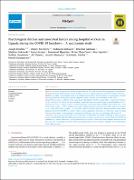| dc.contributor.author | Kirabira, Joseph | |
| dc.contributor.author | Forry, Jimmy Ben | |
| dc.contributor.author | Ssebuufu, Robinson | |
| dc.contributor.author | Akimana, Benedict | |
| dc.contributor.author | Nakawuki, Madrine | |
| dc.contributor.author | Anyayo, Lucas | |
| dc.contributor.author | Mpamizo, Emmanuel | |
| dc.contributor.author | Onen, Bruno Chan | |
| dc.contributor.author | Ingabire, Jane | |
| dc.contributor.author | Gumisiriza, Nolbert | |
| dc.contributor.author | Waiswa, Ali | |
| dc.contributor.author | Mawanda, Anatoli | |
| dc.contributor.author | Ashaba, Scholastic | |
| dc.contributor.author | Kyamanywa, Patrick | |
| dc.date.accessioned | 2022-04-28T08:19:57Z | |
| dc.date.available | 2022-04-28T08:19:57Z | |
| dc.date.issued | 2022 | |
| dc.identifier.citation | Kirabira, J., Forry, J.B., Ssebuufu, R., Akimana, B., Nakawuki, M., Anyayo, L., Mpamizo, E., Onen, B.C., Ingabire, J., Gumisiriza, N. and Waiswa, A. (2022). Psychological distress and associated factors among hospital workers in Uganda during the COVID-19 lockdown–A multicentre study. Heliyon, p.e08807. | en_US |
| dc.identifier.issn | 2405-8440 | |
| dc.identifier.uri | http://hdl.handle.net/20.500.12280/2987 | |
| dc.description.abstract | Objective
To assess the prevalence of psychological distress (PD), and its associated demographic, psychosocial, hospital and health-related factors among hospital workers in Uganda during the COVID-19 related lockdown.
Methods
An online cross-sectional study was conducted among three hundred ninety six participants recruited from eight hospitals and PD was assessed using the Kessler 6 distress scale from May to June 2020.
Results
PD was present in 92.7% of the participants with majority (78.3%) having mild to moderate PD whereas 14.4% had severe PD. Severe PD had statistically significant association with having financial liabilities (O.R = 3.69 (1.55–8.77), p = 0.003). However, ability to maintain contact with family members and friends (O.R = 0.43 (0.22–0.84), p value = 0.013), and having enough personal protective equipment and safety tools at work place (O.R = 0.44 (0.23–0.84), p value = 0.012) were protective against severe PD. having excessive worry about getting infected with COVID-19, conflicts within a home, segregation by friends or community, longer working hours or involvement in management of suspected or confirmed case were not associated with severe PD.
Conclusion
The findings indicate the need to take into consideration the mental wellbeing of health workers during this COVID-19 outbreak. Whereas hospital workers continue to provide their services during the COVID-19 pandemic and related lockdown, it is important that they maintain contact with social support networks and be provided with counselling and mental health and psychosocial services in order to optimise their mental health during this pandemic. | en_US |
| dc.language.iso | en | en_US |
| dc.publisher | Elsevier Science Inc , Ste 800, 230 Park Ave, New York, USA, NY, 10169 | en_US |
| dc.relation.ispartofseries | Heliyon; | |
| dc.subject | Psychological distress | en_US |
| dc.subject | Hospital workers | en_US |
| dc.subject | COVID-19 | en_US |
| dc.subject | Lockdown | en_US |
| dc.subject | Uganda | en_US |
| dc.title | Psychological Distress and Associated Factors Among Hospital Workers in Uganda During the COVID-19 Lockdown–A Multicentre Study | en_US |
| dc.type | Article | en_US |


